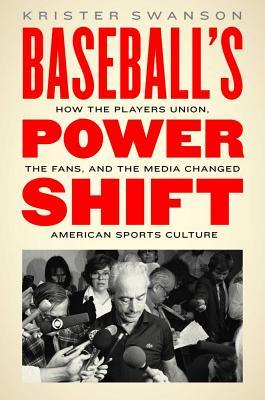From Major League Baseball's inception in the 1880s through World War II, team owners enjoyed monopolistic control of the industry. Despite the players' desire to form a viable union, every attempt to do so failed. The labor consciousness of baseball players lagged behind that of workers in other industries, and the public was largely in the dark about labor practices in baseball. In the mid-1960s, star players Sandy Koufax and Don Drysdale staged a joint holdout for multiyear contracts and much higher salaries. Their holdout quickly drew support from the public; for the first time, owners realized they could ill afford to alienate fans, their primary source of revenue.
Baseball's Power Shift chronicles the growth and development of the union movement in Major League Baseball and the key role of the press and public opinion in the players' successes and failures in labor-management relations. Swanson focuses on the most turbulent years, 1966 to 1981, which saw the birth of the Major League Baseball Players Association as well as three strikes, two lockouts, Curt Flood's challenge to the reserve clause in the Supreme Court, and the emergence of full free agency. To defeat the owners, the players' union needed support from the press, and perhaps more importantly, the public. With the public on their side, the players ushered in a new era in professional sports when salaries skyrocketed and fans began to care as much about the business dealings of their favorite team as they do about wins and losses. Swanson shows how fans and the media became key players in baseball's labor wars and paved the way for the explosive growth in the American sports economy.
Book
Baseball's Power Shift: How the Players Union, the Fans, and the Media Changed American Sports Culture
(Write a Review)
Hardcover
$29.95
From Major League Baseball's inception in the 1880s through World War II, team owners enjoyed monopolistic control of the industry. Despite the players' desire to form a viable union, every attempt to do so failed. The labor consciousness of baseball players lagged behind that of workers in other industries, and the public was largely in the dark about labor practices in baseball. In the mid-1960s, star players Sandy Koufax and Don Drysdale staged a joint holdout for multiyear contracts and much higher salaries. Their holdout quickly drew support from the public; for the first time, owners realized they could ill afford to alienate fans, their primary source of revenue.
Baseball's Power Shift chronicles the growth and development of the union movement in Major League Baseball and the key role of the press and public opinion in the players' successes and failures in labor-management relations. Swanson focuses on the most turbulent years, 1966 to 1981, which saw the birth of the Major League Baseball Players Association as well as three strikes, two lockouts, Curt Flood's challenge to the reserve clause in the Supreme Court, and the emergence of full free agency. To defeat the owners, the players' union needed support from the press, and perhaps more importantly, the public. With the public on their side, the players ushered in a new era in professional sports when salaries skyrocketed and fans began to care as much about the business dealings of their favorite team as they do about wins and losses. Swanson shows how fans and the media became key players in baseball's labor wars and paved the way for the explosive growth in the American sports economy.Hardcover
$29.95